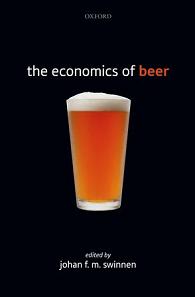A few weeks ago, a wiggling waggy hand rose above the crowd pointing out that there was uncertainty as to who was dabbling in beer blogging in relation to matters in which the blogger had a financial interest. Melissa Cole admitted that there were doubts even about her own writing and that it was all not quite on. It has all devolved into a well deserved bout of slappy heed [Ed.: in the comments] over calling out but not calling out yet the point is still a reasonable one… as is Jeff’s counterpoint… but not Pete’s… Pete’s contribution is not helping things at all.
 Well, as the New York Times tells us things are now more serious than whether one or another or all of us are cool with… or is it cool towards… such practices. Bigger than even Pete Brown (as sophomorically illustrated¹) himself, the UK’s – if not the language’s – real top beer writer. See, the law is now involved as the United States Federal Trade Commission has issued a revision to its “Guides Concerning the Use of Endorsements and Testimonials in Advertising” (warning: big honking burly .pdf) which states in a number of ways that blogging has now gone big time and we know so because the line between comment and endorsement, opinion and advertising has gotten blurred. For instance, the FTC states at page 14 and 15:
Well, as the New York Times tells us things are now more serious than whether one or another or all of us are cool with… or is it cool towards… such practices. Bigger than even Pete Brown (as sophomorically illustrated¹) himself, the UK’s – if not the language’s – real top beer writer. See, the law is now involved as the United States Federal Trade Commission has issued a revision to its “Guides Concerning the Use of Endorsements and Testimonials in Advertising” (warning: big honking burly .pdf) which states in a number of ways that blogging has now gone big time and we know so because the line between comment and endorsement, opinion and advertising has gotten blurred. For instance, the FTC states at page 14 and 15:
The Commission recognizes that because the advertiser does not disseminate the endorsements made using these new consumer-generated media, it does not have complete control over the contents of those statements. Nonetheless, if the advertiser initiated the process that led to these endorsements being made – e.g., by providing products to well-known bloggers or to endorsers enrolled in word of mouth marketing programs – it potentially is liable for misleading statements made by those consumers.
… and further at 47 to 48:
The Commission acknowledges that bloggers may be subject to different disclosure requirements than reviewers in traditional media. In general, under usual circumstances, the Commission does not consider reviews published in traditional media (i.e., where a newspaper, magazine, or television or radio station with independent editorial responsibility assigns an employee to review various products or services as part of his or her official duties, and then publishes those reviews) to be sponsored advertising messages. Accordingly, such reviews are not “endorsements” within the meaning of the Guides. Under these circumstances, the Commission believes, knowing whether the media entity that published the review paid for the item in question would not affect the weight consumers give to the reviewer’s statements. Of course, this view could be different if the reviewer were receiving a benefit directly from the manufacturer (or its agent). In contrast, if a blogger’s statement on his personal blog or elsewhere (e.g., the site of an online retailer of electronic products) qualifies as an “endorsement” – i.e., as a sponsored
message – due to the blogger’s relationship with the advertiser or the value of the merchandise he has received and has been asked to review by that advertiser, knowing these facts might affect the weight consumers give to his review.

 So, while the FTC indicates that it will not go after the bloggers directly, it will go after the advertisers who use new media to get their message out. What will this mean? It may put a chill on ads, samples and…frankly… the goodies. And what the hell point is there blogging if one never gets the goodies??? Well, for those quasi-bloggers who are really professional writers (you know, the book writers) slumming with the cool kids, it will mean absolutely nothing because their revenue is through indirect advertising not the entirely more wholesome and less problematic direct moo-lah stream. Me, I actually get very few samples through the maple wall that is the US-Canadian border and the cash ads mostly come (however oddly) from other nations. But for the poor US based semi-pro beer blogger just looking for a little reason to go on, well, this may be the kick in the pants they don’t really need. So share a silent moment, if you would, for the blogger looking for that one little break, that something in return. It may just have become that bit less likely to arrive in the mail.
So, while the FTC indicates that it will not go after the bloggers directly, it will go after the advertisers who use new media to get their message out. What will this mean? It may put a chill on ads, samples and…frankly… the goodies. And what the hell point is there blogging if one never gets the goodies??? Well, for those quasi-bloggers who are really professional writers (you know, the book writers) slumming with the cool kids, it will mean absolutely nothing because their revenue is through indirect advertising not the entirely more wholesome and less problematic direct moo-lah stream. Me, I actually get very few samples through the maple wall that is the US-Canadian border and the cash ads mostly come (however oddly) from other nations. But for the poor US based semi-pro beer blogger just looking for a little reason to go on, well, this may be the kick in the pants they don’t really need. So share a silent moment, if you would, for the blogger looking for that one little break, that something in return. It may just have become that bit less likely to arrive in the mail.
One last thing. I do think it’s great that the law is actually addressing new media (even if blogging was cool seven years ago and starting going lame about three years ago) but is this at all a likely outcome in an advertising model where a scurrying pack of small operators get paid peanuts to send out a viral message?
In order to limit its potential liability, the advertiser should ensure that the advertising service provides guidance and training to its bloggers concerning the need to ensure that statements they make are truthful and substantiated. The advertiser should also monitor bloggers who are being paid to promote its products and take steps necessary to halt the continued publication of deceptive representations when they are discovered.
No, me neither. Ain’t going to happen.
¹[Ed.: lesson – don’t blog with an eleven year old goading you on to make the cartoon look sillier. Sorry Pete. Really. Sorry. Just think how boring this post would be without your input… err… participation… umm… objectification.]
 I bought this because Simon told me to. Simon said.
I bought this because Simon told me to. Simon said.





 It is interesting to follow beer fans in different jurisdictions in the US and the UK react to various plans to use beer as one way to cope with the global economic crisis. The
It is interesting to follow beer fans in different jurisdictions in the US and the UK react to various plans to use beer as one way to cope with the global economic crisis. The